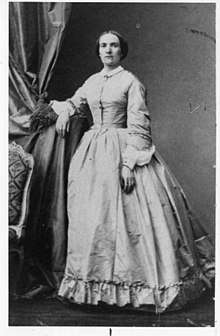Julie-Victoire Daubié
Julie-Victoire Daubié (26 March 1824 in Bains-les-Bains – 26 August 1874 in Fontenoy-le-Château) was a French journalist. She was the first woman to have graduated from a French university when she obtained a bachelor's degree in Lyon in 1861.
Julie-Victoire Daubié | |
|---|---|
 | |
| Born | 26 March 1824 |
| Died | August 26, 1874 (aged 50) |
| Nationality | French |
| Occupation | Journalist |
| Known for | First woman to graduate from a French university (1861) |
Josephine Butler translated a part of Julie-Victoire Daubié's books into English.[1]
Early life
She was born on March 26, 1824,[2] in Bains-les-Bains in the Vosges. Her father died when she was less than two years old, and she and her seven siblings moved with their mother to Fontenoy, staying with the family of their father.[3] She studied Latin, Greek, German, history, and geography with help from her brother.[2] In 1844, she received a teacher's certificate of ability, and had also studied zoology at the Museum of Natural History in Paris. At the museum, she was taught by renowned specialist Geoffroy Saint-Hilaire.[3] Despite her education and lack of laws explicitly barring women from entering academia, she was rejected from numerous French universities. Despite the rejections, she continued taking classes while working as a governess.[2]
Education and career
She entered an essay competition in 1859 held by the Imperial Academy of Science and Fine Letters of Lyon. She wrote a nearly-300-page work titled "The Poor Woman in the 19th Century. Female Conditions and Resources," which detailed professional and academic exclusion for women, wage inequality, and other travails. The essay took first prize, and Daubie was given admittance.[2]
In 1861, she became the first woman to present herself at the baccalaureate exams.[3] She was 37-years-old when she became the first female baccalaureate in France, in August 1861.[2][4]
After her graduation, she continued to write about the conditions faced by women, as an activist and a scholar.[2] She also moved to a large house she purchased in Fontenoy and set up an embroidery shop, which she entrusted to her niece.[3] She also settled on the Champs-Elysee in Paris and became a recognized economic journalist.[3] In 1871, she also became a literature graduate in Lyon, becoming the first female graduate in letters. She also remained activist for women's rights and later a journalist.[4]
Death
She was 50 when she died on August 25, 1874, in Lorraine at the Fontenoy-le-Château, due to tuberculosis.[2][3][4]
Legacy
In March 2018, Google featured her in their "Google Doodles".[4]
References
- French morality, under the regulation system, ed. Trübner, London, 1870.
- "What to Know About Julie-Victoire Daubié, the French Feminist Born 194 Years Ago Today", TIME, Laignee Barron, March 26, 2018
- "194 years ago was born Julie-Victoire Daubié, the first woman to obtain the baccalaureate", RTL Girls, March 26, 2018
- "194 years ago was born Julie-Victoire Daubié, the first woman to win the baccalaureate", March 26, 2018, Le Point
Sources
| Library resources about Julie-Victoire Daubié |
| By Julie-Victoire Daubié |
|---|
- Véronique André-Durupt, Julie-Victoire Daubié la première bachelier, Amis du Vieux Fontenoy, Epinal, 2011.
- Raymonde Albertine Bulger Lettres à Julie-Victoire Daubié, New York, Peter Lang, ed. 1992
- Raymonde Albertine Bulger " Les démarches et l'exploit de Julie-Victoire Daubié première bachelière de France ", The French Review (États-Unis), décembre 1997
- James F. Mcmillan, France and Women 1789–1914: Gender, Society and Politics, ed. Routledge, London, New York,2000.
- The Riverside Dictionary of Biography: A Comprehensive Reference Covering 10,000 of the World's Most Important People, From Ancient Times To The Present Day, ed. Houghton Mifflin, Boston New York, 2005.
- Rebecca Rogers, From the Salon to the Schoolroom: Educating Bourgeois Girls in Nineteenth-Century France, ed. Penn State Press, 2005
- Théodore Stanton The Woman Question in Europe, New York, 1884
Further reading
- "Lettres à Julie Victoire Daubié (1824–1874): La première bachelière de France et son temps (Writing About Women) (French Edition)", Raymonde A. Bulger, Writing About Women Series (Book 2), ISBN 978-0820416212 (May 1, 1992)